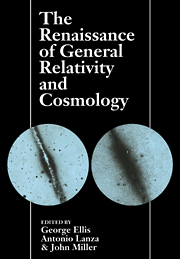 The Renaissance of General Relativity and Cosmology
The Renaissance of General Relativity and Cosmology Book contents
- Frontmatter
- Contents
- Author Addresses
- 1 Introduction
- 2 Exact and inexact solutions of the Einstein field equations
- 3 Inertial forces in general relativity
- 4 Relativistic radiation hydrodynamics: a covariant theory of flux-limiters
- 5 Relativistic gravitational collapse
- 6 The cosmic censorship hypothesis
- 7 The Kerr metric: a gateway to the roots of gravity?
- 8 Galactic astronomy since 1950
- 9 Galaxy distribution functions
- 10 Nonlinear galaxy clustering
- 11 Quasars: progress and prospects
- 12 Decaying neutrinos in astronomy and cosmology
- 13 Cosmological principles
- 14 Anisotropic and inhomogeneous cosmologies
- 15 Mach's principle and isotropic singularities
- 16 Implications of superconductivity in cosmic string theory
- 17 The formation and evaporation of primordial black holes
- 18 Evaporation of two dimensional black holes
- 19 Topology and topology change in general relativity
- 20 Decoherence of the cluttered quantum vacuum
- 21 Quantum non-locality and complex reality
- 22 The different levels of connections between science and objective reality
15 - Mach's principle and isotropic singularities
Published online by Cambridge University Press: 15 December 2009
- Frontmatter
- Contents
- Author Addresses
- 1 Introduction
- 2 Exact and inexact solutions of the Einstein field equations
- 3 Inertial forces in general relativity
- 4 Relativistic radiation hydrodynamics: a covariant theory of flux-limiters
- 5 Relativistic gravitational collapse
- 6 The cosmic censorship hypothesis
- 7 The Kerr metric: a gateway to the roots of gravity?
- 8 Galactic astronomy since 1950
- 9 Galaxy distribution functions
- 10 Nonlinear galaxy clustering
- 11 Quasars: progress and prospects
- 12 Decaying neutrinos in astronomy and cosmology
- 13 Cosmological principles
- 14 Anisotropic and inhomogeneous cosmologies
- 15 Mach's principle and isotropic singularities
- 16 Implications of superconductivity in cosmic string theory
- 17 The formation and evaporation of primordial black holes
- 18 Evaporation of two dimensional black holes
- 19 Topology and topology change in general relativity
- 20 Decoherence of the cluttered quantum vacuum
- 21 Quantum non-locality and complex reality
- 22 The different levels of connections between science and objective reality
Summary
In this contribution, I review the work of Dennis Sciama and his collaborators on Mach's Principle, saying both what Mach's Principle is, and more generally what we should expect a ‘Principle’ to be and to do. Then I review the notion of an isotropic singularity, and the evidence for a connection between isotropic singularities and Mach's Principle. I suggest that a reasonable formulation of the cosmological part of Mach's Principle is that the initial singularity of space-time is an isotropic singularity, and that Mach's Principle may become a ‘theorem’ of quantum gravity.
WHAT IS MACH'S PRINCIPLE?
Mach's Principle is the name usually given to a loose constellation of ideas according to which “the inertia of a body is due to the presence of all the other matter in the universe” (Milne 1952) and “the local inertial frame is determined by some average of the motion of the distant astronomical objects” (Bondi 1952). In Wheeler's aphorism “matter there governs inertia here” (Misner et al. 1973). The aim of Mach's Principle is to explain, without recourse to Absolute Space, the origin of inertia, inertial frames and the standard of non-rotation in Newtonian Mechanics, where the existence of these things is a basic assumption.
- Type
- Chapter
- Information
- The Renaissance of General Relativity and CosmologyA Survey to Celebrate the 65th Birthday of Dennis Sciama, pp. 234 - 247Publisher: Cambridge University PressPrint publication year: 1993


